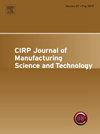Digital tooth surface precision control model in spiral bevel gear processing through surface synthesis method combined with GEMS
IF 4.6
2区 工程技术
Q2 ENGINEERING, MANUFACTURING
CIRP Journal of Manufacturing Science and Technology
Pub Date : 2024-10-22
DOI:10.1016/j.cirpj.2024.10.006
引用次数: 0
Abstract
This paper presents an innovative digital tooth surface precision control model(DTS-PCM) for spiral bevel gears, focusing on the contact parameters derived from the surface synthesis method(SSM) and the pinion tooth surface contact control parameters under Gleason expert manufacturing system(GEMS). This model enables the direct derivation of tooth cutting adjustment parameters for Gleason machine tools, facilitating a seamless integration of design theory with practical processing. Firstly, a novel method for accurately determining the curvature parameters of pinion tooth surfaces, based on predefined contact parameters, has been developed using ease-off topology. Then, based on the pinion gear cutting pitch cone model, a coupled tooth line vector transformation model is proposed to calculate the principal curvature parameters of the nodes. Additionally, a set of equations for the pinion tooth surface contact control parameters is derived, and a formula for calculating the pinion gear cutting adjustment parameters is provided. Finally, two sets of pinion tooth surface contact control parameters were obtained using DTS-PCM: the calculated tooth contact analysis(TCA) and ease-of-topology results. The findings demonstrate that the proposed method is largely consistent with the outcomes of the GEMS calculations, thereby validating the accuracy of DTS-PCM. This indicates that the method can be directly integrated with GEMS software, facilitating practical applications that shorten the design and processing cycle.
通过表面合成法与 GEMS 相结合,建立弧齿锥齿轮加工中的数字齿面精度控制模型
本文提出了一种创新的弧齿锥齿轮数字齿面精度控制模型(DTS-PCM),重点是由表面合成法(SSM)推导出的接触参数和格里森专家制造系统(GEMS)下的小齿轮齿面接触控制参数。该模型可直接推导格里森机床的齿面切削调整参数,促进了设计理论与实际加工的无缝结合。首先,在预定义接触参数的基础上,利用易切拓扑学开发了一种精确确定小齿轮齿面曲率参数的新方法。然后,基于小齿轮切削节锥模型,提出了一个耦合齿线矢量变换模型,用于计算节点的主曲率参数。此外,还推导出一组小齿轮齿面接触控制参数方程,并提供了小齿轮切削调整参数的计算公式。最后,利用 DTS-PCM 获得了两组小齿轮齿面接触控制参数:计算出的齿面接触分析(TCA)和易拓扑结果。研究结果表明,所提出的方法与 GEMS 计算结果基本一致,从而验证了 DTS-PCM 的准确性。这表明该方法可直接与 GEMS 软件集成,从而促进实际应用,缩短设计和加工周期。
本文章由计算机程序翻译,如有差异,请以英文原文为准。
求助全文
约1分钟内获得全文
求助全文
来源期刊

CIRP Journal of Manufacturing Science and Technology
Engineering-Industrial and Manufacturing Engineering
CiteScore
9.10
自引率
6.20%
发文量
166
审稿时长
63 days
期刊介绍:
The CIRP Journal of Manufacturing Science and Technology (CIRP-JMST) publishes fundamental papers on manufacturing processes, production equipment and automation, product design, manufacturing systems and production organisations up to the level of the production networks, including all the related technical, human and economic factors. Preference is given to contributions describing research results whose feasibility has been demonstrated either in a laboratory or in the industrial praxis. Case studies and review papers on specific issues in manufacturing science and technology are equally encouraged.
 求助内容:
求助内容: 应助结果提醒方式:
应助结果提醒方式:


